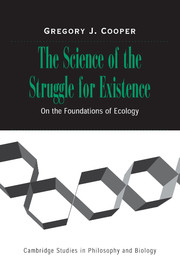Book contents
- Frontmatter
- Contents
- Introduction
- Acknowledgments
- 1 The Struggle for Existence
- 2 The Roots of Controversy
- 3 Must There Be a Balance of Nature?
- 4 The Pursuit of Ecological Generality
- 5 Model Building: A Controversial Craft
- 6 Theoretical Explanation and Fundamental Laws
- 7 The Explanatory Continuum
- 8 Theories, Models, and Explanatory Tools
- Epilogue
- References
- Index
6 - Theoretical Explanation and Fundamental Laws
Published online by Cambridge University Press: 05 May 2010
- Frontmatter
- Contents
- Introduction
- Acknowledgments
- 1 The Struggle for Existence
- 2 The Roots of Controversy
- 3 Must There Be a Balance of Nature?
- 4 The Pursuit of Ecological Generality
- 5 Model Building: A Controversial Craft
- 6 Theoretical Explanation and Fundamental Laws
- 7 The Explanatory Continuum
- 8 Theories, Models, and Explanatory Tools
- Epilogue
- References
- Index
Summary
INTRODUCTION
Chapter Five closed with a philosophical dilemma. It is plausible, on the one hand, to view theoretical models in a conditional way, as vehicles for exploring the possible; and it also makes sense to locate the explanatory potential of such models in this very capacity to put constraints on the actual trajectories that nature might take. On the other hand, the most obvious way that theory might play this constraining role – by approximating fundamental ecological laws – does not appear to be an option. The last two decades have seen ecology in headlong retreat from the idea that there are such fundamental truths. The tendency these days is to celebrate the contingency and historicity of ecological phenomena; even the model builders themselves tend to take a dim view of the prospects for the existence of genuine ecological laws. We are left with some difficult philosophical questions. Do theoretical models really play a genuinely explanatory role? If so, wherein lies their explanatory force, and what are the methodological consequences for the construction and evaluation of such models?
This chapter, as well as Chapters Seven and Eight to follow, turn explicitly to the philosophical literature on scientific explanation for the resources to address these questions. Unfortunately, since the philosophers are not much better off than the ecologists in coming to grips with these matters, there is no consensus philosophical account that can simply be wheeled into position to resolve the problems.
- Type
- Chapter
- Information
- The Science of the Struggle for ExistenceOn the Foundations of Ecology, pp. 176 - 195Publisher: Cambridge University PressPrint publication year: 2003

